The seventh annual summary of this newspaper is only the second to include a general election with a far more open-ended build-up than in 2019. So with such a full 2023, let us start this review without any further ado as from the other end of the year ending tomorrow:
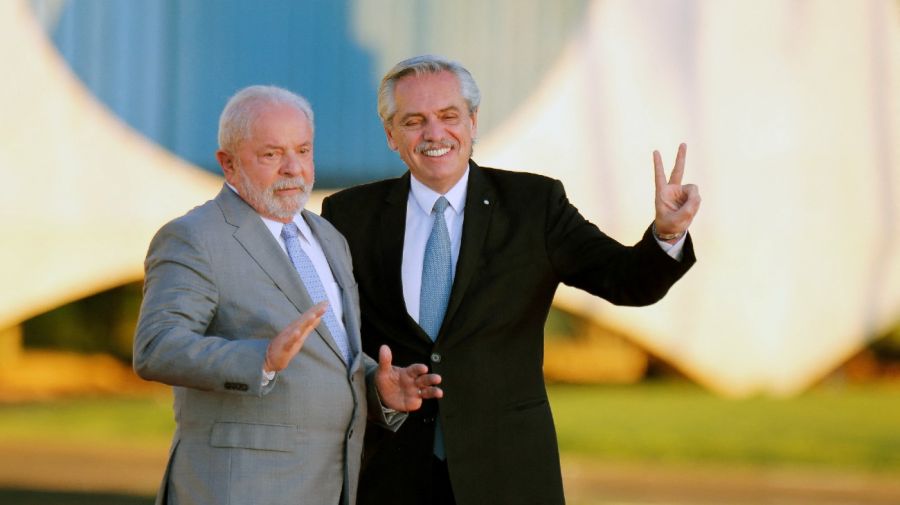
JANUARY
WEEK 1. Argentina’s president begins the year outside the country with Alberto Fernández attending Lula’s inauguration in Brasilia. Inside the country this year of general elections and the Rugby World Cup starts with the main interest lying outside the political arena and portraying rugger in a far uglier light – the beginning of the intensely covered trial of eight rugby-players accused of bashing teenager Fernando Báez Sosa to death in 2020. Upon his return from Brasilia, President Fernández promptly calls for extraordinary sessions of Congress, primarily in order to impeach the Supreme Court in retaliation for its ruling in the penultimate week of 2022 fixing this City’s revenue-sharing cut at 2.95 percent (more than doubling the 1.4 percent to which the Frente de Todos government had slashed the 3.5 percent awarded by the Mauricio Macri presidency although none of these percentages seem excessive for a metropolis housing seven percent of the population). A raft of major price increases to absorb at least some of the inflation of the previous year, especially rents (83-84 percent), bus fares (39 percent) and utility billing (around 30 percent with the withdrawal of subsidies). Nevertheless, almost 20 million Argentines make summer holiday bookings of some kind. President Fernández moves to recruit former agrochemical multinational CEO Antonio Aracre as his chief advisor with a view to a socio-economic pact. Three senior advisors – INADI Anti-Discrimination Institute Victoria Donda, Anti-Corruption Office head Félix Crous and Mint Director Rodolfo Gabrielli – fail to see the year in, resigning just beforehand, while Buenos Aires City Security Minister Marcelo D’Alessandro (embroiled in the Lago Escondido huddle with judges and businessmen) only continues a couple of days before taking a “temporary” leave of absence. The 190th anniversary of the British seizure of the Malvinas (J3) is duly marked with affirmations of Argentine sovereignty. The Emir of Qatar, the host of the 2022 World Cup, yachts in from Punta del Este to greet the new champs, draping a traditional Arabic cloak around Lionel Messi.
W2. The INDEC national statistics bureau posts a total annual inflation of 94.8 percent for 2022, the highest rate in 32 years but narrowly escaping the three-digit inflation which was to dog the year ending tomorrow. Amid the usual summer holiday news vacuum, attention here again centres on Brazil as much as Argentina when in the year’s first weekend all three branches of government (the presidential residence, Congress and the Supreme Court building) in Brasilia are assailed by rightist bad losers inflating Jair Bolsonaro’s 58 million votes the previous October into a majority – President Fernández predictably expresses his outrage, along with much of the world. An opinion poll early in this electoral year already points to acute political disenchantment with less than 45 percent support for the two main coalitions combined with only around 10 percent for Javier Milei’s libertarians. Greta Pena replaces Donda at INADI. The German-language Argentinisches Tageblatt (since 1889 the heir of the Argentinisches Wochenblatt, founded in 1878) prints its last edition (J13).
W3. A prolonged drought is starting to worry both the farming sector and the government with potential losses already estimated at US$10 billion, despite which Economy Minister Sergio Massa announces a US$1-billion debt bond buyback in an attempt at a confidence shock (perhaps propped up by optimistic hopes of assistance from friendly Chinese and Brazilian governments). The first austerity drive of the year as Social Development Minister Victoria Tolosa Paz announces the suspension of over 150,000 welfare beneficiaries failing to prove qualification for the Plan Potencia Trabajo job assistance programme. Black-shirted teamsters are deployed to add muscle to price controls. A survey shows Argentina to have the lowest job satisfaction in Latin America with less than a third of the participants responding positively. Two anniversaries – the seventh of the death of AMIA special prosecutor Alberto Nisman and the third of Báez Sosa’s death as the Dolores trial of his killers continues.
W4. The VII Summit of the Community of Latin American and Caribbean States (CELAC) hosted here by President Fernández welcomes the subcontinent’s largest country back into the fold from which Bolsonaro had withdrawn it – Lula was always going to be the star but even more so with the presidents of Mexico, Peru, Venezuela and Ecuador all absent. Plenty of wishful thinking about energy projects and a common currency with generally centre-left overtones from two presidents at opposite ends of their terms but no concrete advances towards regional integration. Lula denies both Vice-President Cristina Fernández de Kirchner and Interior Minister Eduardo “Wado” de Pedro their photo ops. German Chancellor Olaf Scholz pays a flying visit in the last weekend of the month. Mapuche militant leader Facundo Jones Huala is apprehended in El Bolsón (Río Negro) after a year on the run. The Báez Sosa trial heads towards its climax with the prosecutor Fernando Burlando seeking life sentences for all eight defendants. Pope Francis bemoans Argentine poverty rising from five percent in his schooldays to 52 percent now (sic, no other estimate at the time is higher than 43 percent) – presidential spokesperson Gabriela Cerruti blames the previous Mauricio Macri administration. For his part Macri hosts PRO presidential hopeful Patricia Bullrich and husband Guillermo Yanco at his Villa La Angostura Patagonian holiday home. On the last day of the month drought relief measures are announced and the latest update is published for what was originally the 2020 census but delayed until last year by the coronavirus pandemic – it reduces the population estimate from 47,327,407 to 46,044,703 with the gender mix also changing from 52.83 to 51.76 percent female and much important information still missing after eight months. The fact that the population of La Matanza is shown as rising by half a million less than it would have done with the average projection also brings the 2010 census into question in retrospect. The film Argentina, 1985 is nominated as one of the five Oscar candidates for Best International Feature Film. At the close of the January transfer window midfielder Enzo Fernández moves from Benfica to Chelsea for a Premier League record fee of 121 million euros.
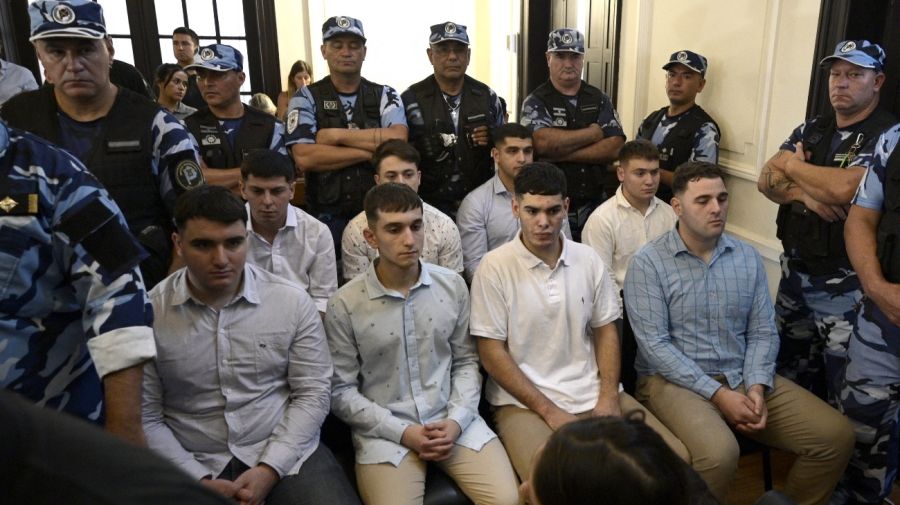
FEBRUARY
W5. The Báez Sosa trial overlaps with an even more horrific crime as on the second day of the month in La Pampa Magdalena Espósito Valenti and her partner Abigail Páez are found guilty of the brutal killing of five-year-old Lucio Dupuy. Social activist Juan Grabois tosses his hat into the presidential ring although offering to step aside if Wado de Pedro is given the nod.
W6. Five of the eight defendants in the Báez Sosa trial are sentenced to life imprisonment while the other three are given 15 years. Both sides appeal, calling for lighter sentences and life imprisonment for every defendant respectively, while prosecutor Burlando jumps on the publicity to proclaim his Buenos Aires gubernatorial candidacy. Former Catamarca Peronist governor Ramón Saadi, whose grip on his province was cut short by an earlier high-profile murder (María Soledad Morales in 1990), dies two days after turning 74 – singling out one savage crime among many then and now perhaps responds to a need to restore inhumanity to human dimensions. Scorching temperatures close to 40 degrees in a summer holiday week minimise the news with the extraordinary sessions of Congress paralysed by the opposition boycott to protest the impeachment of the Supreme Court – beyond that there is gridlock with the two main coalitions polarised and fragmented at the same time (especially Juntos por el Cambio between Bullrich’s hawks and City Mayor Horacio Rodríguez Larreta’s doves, purism versus consensus). But some chronic themes of the year recur – violence in Rosario leading to a security purge and an advance mission of the International Monetary Fund (IMF) comes to town with the usual corollary of downtown picket activity plus leftist militants marching on the Lago Escondido ranch of British billionaire Joe Lewis down in Patagonia.
W7. The year’s inflation is off to a bad start with INDEC posting six percent for January on Saint Valentine’s Day, the triple number of the beast in the Book of the Apocalypse – perhaps no surprise with both currency depreciation and interest rates at that percentage and utility billing updates even higher, thus making Massa’s proclaimed target of three percent inflation by April already wishful thinking. Furthermore, the minister’s will to tame inflation is in doubt since it helps to control the fiscal deficit via higher nominal revenues and lower public spending in real terms while accelerating consumer spending. The election year kicks off with primary voting in La Pampa although Peronist Governor Sergio Ziliotto going unchallenged leads to a low turnout of under 13 percent – only Juntos por el Cambio candidacies are contested with the Radical Martín (Berhongaray) defeating PRO’s Martín (Maquieyra) for the gubernatorial nomination. AFI intelligence trustee Agustín Rossi becomes the new Cabinet chief, replacing Juan Luis Manzur who returns to his native Tucumán to be the bottom half of the Peronist gubernatorial ticket in the May 14 provincial elections. A policewoman is killed with her own firearm at a Retiro underground station, leading to renewed calls for Taser stun guns. Power cuts amid continually high temperatures. The Defence Ministry deploys fighters opposite the Malvinas islands for the first time this century. Donda becomes the Undersecretary for the Analysis and Monitoring of Strategic Policies in Buenos Aires Province, which she describes as a “huge responsibility.” Cristina Kirchner reaches her three score and ten (F19), her “Get out of Jail Free” card ensuring house arrest to be the worst possible outcome of the many court trials confronting her.
W8. Competing for attention with the first anniversary of the Ukraine war and Carnival week, City Mayor Horacio Rodríguez Larreta launches his long-awaited presidential bid from the bottom of the country with every reason to imagine himself Argentina’s next leader, placing his accent on ending the grieta polarisation. He is followed in the last weekend of the month by 2015 Peronist presidential candidate Daniel Scioli. The anniversary of the Ukraine war draws a generally negative balance – Argentina has more than its fair share of the global inflation while falling short on the crisis opportunities offered by higher energy and food prices with the 2022 fuel import bill doubled while a drought-stricken farming sector is unable to take much advantage. Nevertheless, Vaca Muerta shale, lithium and better luck with future harvests could still bring Argentina dividends from Ukraine’s tragedy. The Senate Peronist caucus, already artificially divided 10 months previously to grab an extra Council of Magistrates seat, splinters again as five inland senators break away to form a Unidad Federal caucus seeking a broader agenda than judicial reform, thus leaving Vice-President Fernández de Kirchner with only 31 of the 72 senators at her beck and call with quorum now more elusive. A pension moratorium passed by Congress by a 134-107 vote extends retirement benefits to 800,000 more people with incomplete contributions (in many cases housewives).
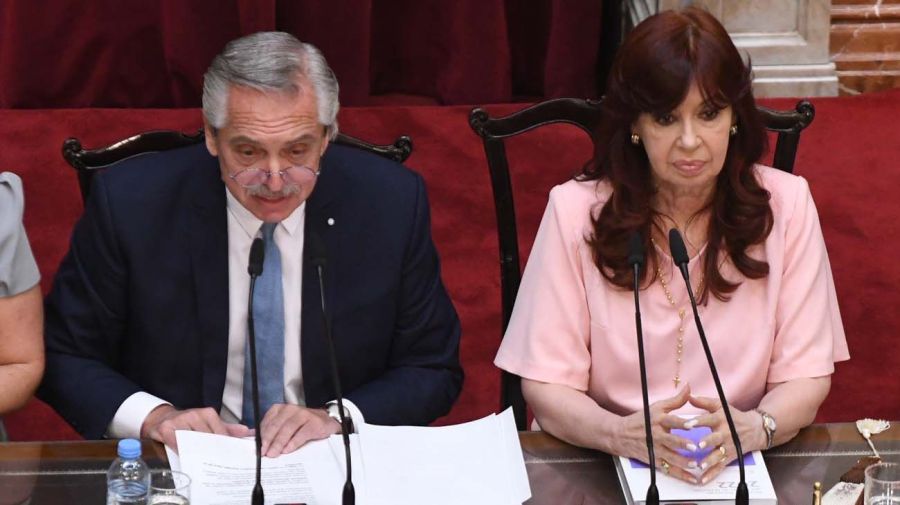
MARCH
W9. The last state-of-the-nation speech by President Fernández to open Congress on the first day of the month is a sad swan song for a sad presidency – lasting a full two hours, the first 90 minutes are a monotone recital of often spurious achievements (such as keeping pensions 12 percent ahead of inflation) but almost all the reactions are to the final explosive half-hour of his gloves-off attack on the judiciary, perhaps also a useful distraction. The President also went one better than reducing the federal revenue-sharing allocation of a Buenos Aires City housing almost seven percent of the population to 1.4 percent by saying that it did not deserve anything at all. On the economic front, he boasted record employment and exports, doubled public works and bumper summer tourism as part of 5.4 percent growth last year but failed to mention its corollary of 94.8 percent inflation. The speech totally lacks the legislative road map and policy announcements which are supposedly its essence. The presidential harangue is literally overshadowed on the same day by Argentina’s biggest power cut in four years. In Rosario the supermarket belonging to football superstar Lionel Messi’s in-laws is strafed with a mafia message left behind. At a G20 forum in New Delhi Foreign Minister Santiago Cafiero scraps the 2016 Foradori-Duncan agreement over the Malvinas with the Córdoba stopover for flights between São Paulo and the islands discontinued the following week.
W10. After dividing so much of Argentine life, Cristina Fernández de Kirchner also goes dividing International Women’s Day (M8) which is marked by two separate marches – one the traditional advocacy of feminist causes and the other “against the [electoral] ban” on the veep (which fails to impress the courts, who the following day confirm the previous December’s six-year prison term and disqualification from public office by giving the grounds for the sentence). In mainstream news the highlight is Massa’s success in rolling over peso debt bonds to the tune of 7.5 trillion pesos at the start of the week – a slam dunk because, given the zero chance of being paid, creditors have no choice but to renew the bonds or trigger a catastrophic default with Argentina’s domestic debts now also becoming “too big to fail.” In Mendoza for the Vendimia wine festival, Massa announces his latest exchange rate – the “dollar Malbec.” Following drug gang carnage in Rosario throughout his presidency, Alberto Fernández reacts to the strafing of the supermarket belonging to the Messi in-laws by sending 400 more Border Guards and unarmed military engineers to the troubled city in midweek. Close to the 50th anniversary of Héctor Cámpora’s victory in an interview with the ultra-Kirchnerite publication El Destape, a loose-lipped President Fernández speaks of “bringing 20 years of Kirchnerism to an end” by besting a Kirchnerite rival in the PASO primaries. On the eve of the 10th anniversary of his papacy, Pope Francis gives a marathon interview to PERFIL’s Jorge Fontevecchia.
W11. The diabolical number of six (with 666 the “number of the beast,” according to the Book of the Apocalypse) returns to haunt Massa with February inflation of 6.6 percent following hard on January’s six percent – the minister’s “three percent by April” looks increasingly like wishful thinking with core inflation of 7.7 percent and the key item of food and beverages surging 9.8 percent while annual inflation enters three-digit territory (102.5 percent). The Central Bank reacts by raising annual interest rates to 78 percent. Persistent drought, which among other consequences dictates pesos being massively printed to replace the export dollars, does not leave the future looking any brighter, especially with Silicon Valley Bank’s collapse at the start of the week triggering a digitally accelerated burst of international financial panic. The drought is accompanied by scorching temperatures and massive power cuts making for a slower week while President Fernández drops out of circulation with a lumbar hernia. Jujuy tycoon Carlos Blaquier dies at the age of 95 after eluding trials for complicity in crimes against humanity for decades. A vacancy of over 10 weeks at the Anti-Corruption Office is finally ended when President Fernández names socialist lawyer Verónica Gómez just before entering hospital.
W12. The government imposes a bond swap on all state agencies whereby they must sell off all their securities in foreign currency, exchanging them for peso-denominated debt of dubious worth. The last Memory Day (M24) of this Kirchnerite administration is held with its significance somewhat detracted by being turned into a long weekend and almost celebrated by some militants seeking to turn a national cause into a sectarian ideological banner – Cristina Fernández de Kirchner makes the rash claim that human rights were never on the agenda until her late husband came to office in 2003 as if nobody had seen the film Argentina, 1985 which had just come within an inch of winning an Oscar. Yet the opposition could do more to protest its arbitrary exclusion from the human rights cause too. More moderate temperatures and less power cuts do not stop the government from slapping a six-month state trusteeship on Edesur power utility under Avellaneda Mayor Jorge Ferraresi. In hot water since his Lago Escondido huddle with judges and media executives in the previous December, D’Alessandro finally resigns (accepted by Rodríguez Larreta despite insisting on his innocence) and is replaced as City Security minister by Eugenio Burzaco, who seconded Patricia Bullrich when heading the Security Ministry at national level between 2015 and 2019. With inconsequential friendlies against Panama and Curacao as their excuse, the World Cup football champions come home for a week of celebrations. The Buenos Aires Herald (a newspaper between 1876 and 2017) is relaunched on the symbolic date of Memory Day as an online publication under the umbrella of Ámbito Financiero and Grupo Indalo, the same owners who shuttered the publication in 2017.
W13. Macri’s self-exclusion from this year’s presidential race (“a triumph over ego”) following weeks of speculation overshadows a cosy if inconsequential 20-minute White House meet between Presidents Alberto Fernández and Joe Biden (while the former’s predecessor takes just six minutes to bow out). Massa is also stateside chasing dollars as usual, announcing from Washington the extension of the “soy dollar” to regional economies. While all other opposition leaders hail Macri’s “statesmanship,” analysts are divided as to his presumed ulterior motives – did he feel doomed to defeat given his massive unpopularity or that an election which was his to lose because of the drought-stricken economy’s free fall was also a good election to lose because of that free fall, mindful that since Néstor Kirchner struck lucky with the global commodity price boom (2003-2007), each presidency has been seen as worse than the one before (even when the same person)? Macri throws out hints that he sacrificed his own shaky presidential candidacy for his cousin Jorge Macri’s far more solid mayoral candidacy while being far more explicit in saying that he would subordinate everything to ending the “demolition squad” of Kirchnerite rule. Inside the Oval Office a lame duck Fernández fails to gain specific backing from his host “Sleepy Joe” Biden for his crusade against IMF surcharges but is assured of future United States support in negotiations with creditors. The President spends much of the week abroad with attendance at the Ibero-American Summit in the Dominican Republic and a lengthy stopover in New York City. Back home the Leliq quasi-fiscal deficit reaches 12 trillion pesos (from just over a trillion at the start of the Frente de Todos administration), perhaps a bigger cancer than the fiscal deficit obsessing most economists, while Standard & Poor downgrade Argentina to CCC-, just three notches above default. In the last weekend of the month, María Kodama, the widow of Jorge Luis Borges, dies at 86, the same age as the great writer.
APRIL
W14. Crime supplants election politics and economic uncertainties at the top of the agenda in the first days of the month with La Matanza bus-driver Daniel Barrientos killed by criminals, prompting infuriated colleagues to punch and kick Buenos Aires Province Security Minister Sergio Berni until he was rescued by the City Police riot squad – an early outburst of anti-system rage against the “caste,” which responded badly with both Berni and Buenos Aires Province Governor Axel Kicillof feeling sorrier for themselves than for the dead Barrientos as the alleged victims of their conspiracy theories instead of facing up to their responsibilities to defend law and order. If the killing had stemmed from opposition malice, it would surely have been more strategically timed for the eve of voting than months beforehand. All of which does not justify bashing Berni to a bloody pulp or a media hype ignoring a Rosario murder rate four times as high as La Matanza. Massa announces the third take of his “dólar agro” (now up to 300 pesos) for soy and the first also extending to regional economies as drought ravages continue. Not too much other news in Easter week with bumper tourism (some 2.65 million people on the move) – an adverse London High Court ruling sentencing the country to pay 1.33 billion euros for short-changing growth-linked bonds, midweek picket activity and a meaningless presidential visit across the Andes to Chile. Marking the 41st anniversary of the outbreak of the South Atlantic War (A2) also takes the bizarre form of Malvinas Secretary Guillermo Carmona celebrating runaway Scottish Premiership leader Glasgow Celtic’s 2-0 victory over humble Ross County because the second goal by a compatriot leads to Argentine prowess being saluted on British soil.
W15. City Mayor Rodríguez Larreta throws a spanner into the Juntos por el Cambio works by calling the elections for his successor for the same August 13 date as the nationwide PASO primary with a split system (electronic for the former, paper for the latter) – ex-president Macri and most other PRO leaders are openly critical with the tension between the party’s hawks and doves right out in the open, disputing whether the fast track or consensus gradualism is their methodology and whether the anti-state groundswell of public opinion or the middle ground is their electoral target group. Opposition divisions also arise inland with the upcoming provincial elections in Neuquén and also in Mendoza (with PRO leader Omar De Marchi’s walkout). The Senate holds its first session of a year in which the political class is under fire from anti-system challengers questioning the state as such – the so-called “Ley Lucio” (named after the brutally murdered five-year-old Lucio Dupuy) for the prevention and early detection of violence against children is unanimously approved by the 65 senators present but no further progress with the legislative backlog. Security Minister Aníbal Fernández warns of “streets drenched with blood” should the opposition win the elections.
W16. The electoral year begins in earnest (February’s La Pampa primary voting aside) with the elections in Neuquén and Río Negro, two Patagonian provinces housing just three percent of the population – an upset (more apparent than real) in the former and continuity in the latter. On the one hand, six decades of rule (at least in all periods of democratic rule) by the Neuquén Popular Movement (MPN in its Spanish acronym) is ended at the height of Vaca Muerta shale prosperity and on the other hand, the governor-elect is an MPN offshoot – in fact, the election is basically a contest between the current and previous lieutenant-governors of outgoing Governor Omar Gutiérrez, Marcos Koopmann and Rolando Figueroa with the latter winning by just 2.5 percent (backed by Macri against Juntos por el Cambio’s Radical candidate). Oil workers backed Koopmann and frackers Figueroa. The three main national forces do not even win a quarter of the vote combined (12.74 percent for Frente de Todos, eight percent for the libertarian candidate and 3.77 percent for the abandoned Radical). In Río Negro Senator Alberto Weretilneck, already governor between 2012 and 2019, romps back to provincial power with 43.74 percent of the vote although a bigger landslide had been expected – around a quarter of that vote comes from the opportunistic support of La Cámpora Kirchnerite youth grouping running against two other Peronist candidates responding to Justice Minister Martín Soria (son of an ex-governor murdered by his own wife) and Santa Cruz Governor Alicia Kirchner. Elsewhere in Patagonia Juntos por el Cambio win the mayoral elections in the important Chubut city of Trelew. Chief presidential advisor Aracre, hired at the start of the year, resigns after little over 100 days in office, apparently as the result of a jealous Massa insistence on being the super-minister in total control of the economy. Just three days later President Fernández finally confirms that he will not be seeking a second term (A21), not normally the kind of news to be buried deep down in a weekly summary but very much the chronicle of a death foretold. INDEC posts 7.7 percent inflation for March (including education up 29.1 percent at the start of the school year), pushing annual inflation into three digits. FIFA confirm Argentina as the hosts of the Under-20 World Cup as from May 20 after Indonesia blackballs the Israeli squad.
W17. The week starts with sharp market reactions to President Fernández prematurely becoming a lame duck (announced on the eve of the previous weekend in the hope of softening the impact) with the “blue” dollar hovering around 500 pesos while interest rates are hiked to 91 percent from 78 percent in mid-month as the snowball of the Leliq and other bonds issued to “sterilise” the extravagant money-printing reaches 13 trillion pesos. The President takes the situation much more calmly with a light-hearted interview in which he expresses a preference for Robert De Niro to play him should a film ever be made of his life. On a more serious note President Fernández maintains his support for contested PASO primaries for Frente de Todos while withdrawing his own candidacy. Meanwhile his veep continues to resist the less than deafening “Draft Cristina” calls while letting rip against the IMF and libertarian leader Javier Milei (who is increasingly starting to spook the political establishment in this month and who is already proposing plebiscitary democracy to offset his likely parliamentary weakness). Massa is thus now president in all but name by default with a gridlocked Congress unable to step into the vacuum. US Southern Command chief General Laura Richardson visits. The Book Fair opens in Palermo (A27). On the very last day of the month Colorado Santiago Peña (44, a young candidate running for an old party) is elected Paraguay’s next President with 43 percent of the vote against an almost evenly divided opposition, the centre-left’s Efraín Alegre (27 percent) and anti-system populist Paraguayo ‘Payo’ Cubas (23 percent).
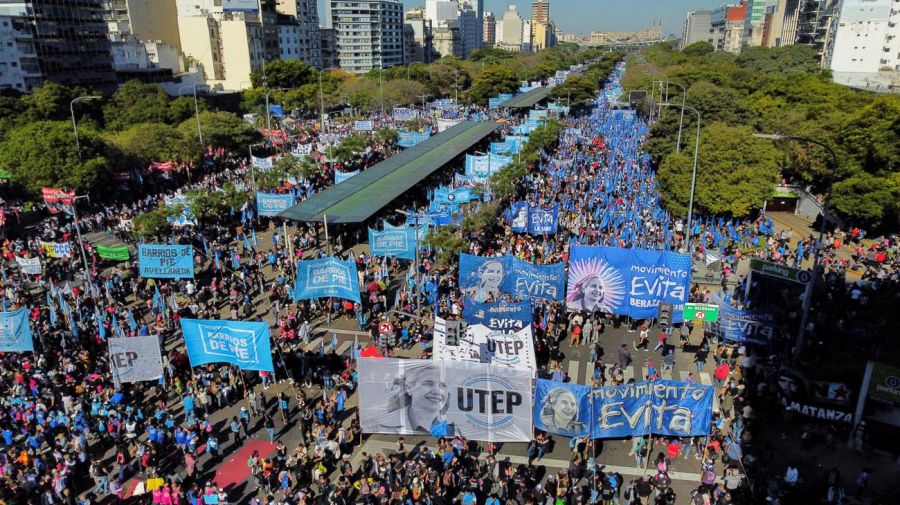
MAY
W18. Nothing too remarkable during a week beginning with May Day and ending in the coronation of King Charles III. Former Buenos Aires Province governor María Eugenia Vidal drops out of the presidential race while Jorge Macri confirms his mayoral run, both developments within PRO. No mass May Day protests but numerous rallies of a few thousands from a fragmented left, all anti-IMF. President Fernández seeks help against the IMF from Lula in Brasilia in a meeting with little more than a move towards export credits in regional currencies rather than dollars. The Book Fair’s bestseller is an analysis of Greater Buenos Aires sociology rather than any escapist fiction (with 54 percent wanting to leave the country according to one opinion poll) in an election year enlivened by Milei’s extravagant showmanship with organ sales as his latest controversial proposal although some observers are already beginning to ask if there might not be method in the madness.
W19. The government’s ongoing conflict with the Supreme Court escalates to new heights when three of the four justices disqualify the Peronist candidates in San Juan and Tucumán for exceeding their constitutional shelf life (nothing unprecedented with similar rulings in 2013 and 2019 while two of the targets, Santiago del Estero’s Gerardo Zamora and Río Negro’s Weretlineck, remain governors today). The dispute may even have been triggered by the government inducing provincial courts to drag their feet until almost the last minute. Supreme Court Chief Justice Horacio Rosatti further aggravates the government by criticising “uncontrolled money-printing” at the AmCham Summit (addressed by four leading presidential hopefuls). On the eve of the weekend INDEC posts 8.4 percent inflation for April, outrunning all forecasts. The second round of 2023 voting in Jujuy, La Rioja and Misiones results in comfortable wins for the incumbent provincial governments in all three cases (although re-elected La Rioja Peronist Ricardo Quintela is the only same face with over 13 percent of the population on the provincial payroll) but no major nationwide swing with the Radicals retaining Jujuy and the theoretically neutral Concordia front Misiones. Carlos Sadir, the economy minister of outgoing Radical Governor Gerardo Morales, falls just short of an absolute majority (49.52 percent), Quintela tops half the vote (50.6 percent) and 2015-19 Misiones governor Hugo Passalacqua returns to his old job with an overwhelming 64.3 percent (nevertheless below his party’s 72.4 percent in 2019). But the true master of Misiones remains Carlos Rovira, the 1999-2003 Peronist governor whose loss of Justicalist Party control to Ramón Puerta prompted him to invent the Concordia label, only for his 2006 bid to secure infinite re-election via a single-clause constitutional reform to crash in a referendum fiasco. The Jujuy Radicals improve their 2019 vote thanks to lithium and the nationwide swing against the central Frente de Todos government while the left lose nearly half their stunning 2021 midterm success of almost a quarter of the vote, relinquishing second place to the Peronists (22.3 percent). A disappointing day for libertarians – an illustrious surname and an ultra-fashionable ideology fail to clinch second place for Martín Menem in La Rioja (15.6 percent) while 3,318 votes in Misiones seem incompatible with any nationwide victory. The Vice-President accuses Patricia Bullrich of being ultimately behind the attempt on her life on September 1, 2022.
W20. Vice-President Cristina Fernández de Kirchner finally confirms her rejection of any candidacy in resistance to “Draft Cristina” pressures by claiming to be judicially “banned,” thus leaving political polarisation without its two main pillars with Macri dropping out earlier. With Tucumán suspending its elections while San Juan goes ahead with all levels except the gubernatorial (with the Peronists winning 15 of the 19 town halls but losing the provincial capital), the third round of provincial voting in Salta, La Pampa and Tierra del Fuego (the latter the country’s two smallest electorates although Salta’s is seven-digit) could hardly be less interesting – all three governors more or less allied to the national government are all re-elected, Salta’s Gustavo Sáenz (47.5 percent for his “Gustavo Gobernador” ticket), La Pampa’s Ziliotto (47.6 percent) and the gay ex-priest Gustavo Melella (51.3 percent) in Tierra del Fuego are all re-elected (although reduced percentages in all three cases). Only La Pampa is competitive with the Radical Berhongaray losing by barely six percent in a highly polarised race while Melella and Sáenz run up margins of 40 and 30 percent respectively – continuity rules OK. Salta is especially confused with Sáenz backed by PRO and Radical elements while one of his rivals manages to merge La Cámpora, libertarian and quasi-fascist support to reach 16 percent. In Tierra del Fuego the real star is the blank vote of 21.7 percent, over thrice the 7.1 percent vote for the libertarian candidate, a female evangelical preacher, while the Juntos por el Cambio vote is split between PRO and Radicals. A third of districts have now voted but barely an eighth of the electorate. Milei presents a 64-plank election platform including dollarisation, mass privatisation, deregulated gun possession and scrapping sex education among its most controversial proposals. PRO reach agreement on a single mayoral candidate. Massa is increasingly desperate in the face of the economic crisis, upping interest rates to 97 percent (when Peronist consumer-led growth policies normally encourage people to spend, not save) and instructing the Central Market to import food to hold prices down (in an agricultural heavyweight lacking dollars and as if the Central Market had any sales network abroad) – he also demands all the year’s IMF remittances upfront. In the same week Cristina Fernández de Kirchner rubbishes any correlation between printing money and inflation with the quasi-fiscal deficit already at 13 trillion pesos. The Federal March of pickets from all points of the country converges on the Obelisk and Plaza de Mayo as the poverty line reaches a monthly 200,000 pesos. Marcelo Bielsa becomes Uruguay’s new football coach.
W21. Kirchnerism marks its 20th anniversary in power with a Plaza de Mayo rally and a long solo harangue by Cristina Fernández de Kirchner against the IMF and the courts “banning her candidacy” – in the pouring rain (as in the first May 25 in 1810), very strange (like Penny Lane). The wheel seems to have come full circle from 2003 with presidential impotence, runaway inflation and a political “caste” in massive disrepute then and now. The two Kirchnerite decades have seen economic growth in 12 of its 16 years in office, largely thanks to savings being diverted into consumer-led growth via negative interest rates, but a public sector almost doubled during the growth years is no longer sustainable, even if a makeshift welfare state delays the crisis – the system seems to be nearing exhaustion. Perhaps a good election to lose with the last three presidents all sitting it out. Crime returns to the spotlight when a Buenos Aires provincial policeman is charged with aggravated homicide for gunning down a motochorro pushing his luck, drawing from Patricia Bullrich the exaggerated claim: “If it had been the other way round, the motochorro would have walked free.” Milei picks cumbia singer Adrián ‘El Dipy’ Martínez as his La Matanza mayoral candidate while in the week’s only election, the small Córdoba township of Corral de Bustos, the libertarian wins just 3.5 percent. The 2,000-peso banknote enters circulation.
W22. Argentina takes its first step into BRICS (Brazil, Russia, India, China and South Africa) with acceptance by its New Development Bank, announced by Massa during his mission to China (accompanied by Máximo Kirchner on his first trip abroad ever) – the minister thus hopes to repair Central Bank reserves several billion dollars in the red with a new sugar daddy although China is both interlinked with the IMF and charges higher interest rates. President Fernández leaves China to Massa, flying instead to Brasilia to relaunch Unasur and to join Lula in seeking the return of Venezuela to Mercosur. Pope Francis makes the surprise choice of Río Gallegos Bishop Jorge Ignacio García Cueva, 55, a former slum priest and prison chaplain, to replace retiring Buenos Aires Cardinal-Archbishop Mario Poli, 75. City Mayor Horacio Rodríguez Larreta confirms Jorge Macri as the sole PRO mayoral candidate (understood by many as Mauricio Macri’s condition for withdrawal from the presidential race) and at the same time authorises police use of Taser stun guns. Cabinet Chief Agustín Rossi tosses his hat into the presidential ring and Social Development Minister Victoria Tolosa Paz into the gubernatorial. Apart from Daniel Scioli eager for a rewind of 2015, Frente de Todos is seemingly bereft of a candidate with Eduardo ‘Wado’ de Pedro an opinion poll non-starter, Massa stymied by an adverse economy and Kicillof intent on staying put in his comfort zone. Milei expresses confidence in a run-off victory.

JUNE
W23. Football superstar Lionel Messi’s move to Miami crowds out all other news. The belated bid of Rodríguez Larreta and Jujuy Governor Morales to enlist Córdoba Peronist Governor Juan Schiaretti into Juntos por el Cambio in the same month as the Córdoba provincial election (why vote for any PRO or Radical candidate if Schiaretti is in the same team?) is blackballed by the coalition’s hawks who prefer to look in Milei’s direction – even if Macri’s 2019 running-mate was also a Peronist, Miguel Angel Pichetto. Hawks argue that a rainbow coalition would dilute reform while doves counter that hawkish purism risks leaving Juntos behind the libertarians. Peronist governors urge a single presidential candidate with the election far from lost despite economic disaster, given a divided opposition and an increasingly atomised scenario. Milei confirms Ramiro Marra as his City mayoral candidate while the libertarian lion runs into dissent from some recent converts with the economists Roque Fernández and Diana Mondino respectively disavowing dollarisation and elimination of the Central Bank. Not much in the way of platforms coming from anybody. Massa raises the income tax floor to a monthly 880,000 pesos.
W24. A total of seven electoral alliances are confirmed in midweek for the PASO primary with the Frente de Todos tag anticipating the extinction of the government bearing its name, now rebranded as Unión por la Patria (Union for the Homeland). On the eve of its provincial primary Chaco is rocked by the uproar over the disappearance and suspected femicide of Cecilia Strzyzowski, the daughter-in-law of prominent picket leader Emericiano Sena, a key ally of Peronist Governor Jorge Capitanich. The main opposition coalition Juntos por el Cambio (one of the seven alliances registered) has the upper hand in the previous weekend's inland voting, ending four decades of Peronist rule in San Luis and more than doubling the votes of rival lists in the Mendoza primary and the Corrientes midterms as against a landslide Peronist win in Tucumán. Neither of the two governors-elect is new to the job – Claudio Poggi governed San Luis as a Peronist between 2011 and 2015 before changing sides while Tucumán’s Osvaldo Jaldo was acting governor during Manzur’s stint as Cabinet chief. Juntos por el Cambio thus accepts the support of Poggi ally and 2001 default president Adolfo Rodríguez Saá while shunning the ultra-prudent Schiaretti. There is thus still no clear change in any province so far this year with the only ruling party defeats coming from their own splinters (Neuquén and San Luis) – it is an election where anything could happen but nothing is happening in the provinces where the high percentages of provincial government employees are often decisive. No libertarian win anywhere looks likely as the high hopes in Ricardo Bussi (who polled almost 14 percent in 2019) are dashed with not even four percent in Tucumán – is the roaring lion a paper tiger? Annual inflation stays in three digits as INDEC posts 7.8 percent for May.
W25. A week northwest by northeast as Jujuy explodes with protests against anti-picket clauses (supported by 11 of the 13 Peronist constituent assembly delegates) in the Radical provincial government’s constitutional reform with dozens of injuries and arrests following an attempt to torch the provincial legislature while Capitanich crashes to defeat in the Chaco primary against the gruesome backdrop of the Strzyzowski disappearance, picking up the most votes individually but trailing the two Radical hopefuls by six percent in a low turnout of 58 percent. The national government regards the former as a welcome distraction from the latter and overacts its indignation while the opposition blames the Jujuy violence on Greater Buenos Aires Kirchnerites being bussed in, ignoring the local extremism in Milagro Sala’s province. At the other end of the week the deadline for primary nominations expires. ‘Wado’ de Pedro is given the nod by Cristina Fernández de Kirchner and launches his “Yo quiero ser tu Presidente” campaign until displaced by a Massa power play at the last minute with Grabois replacing Scioli as the alternative in order to keep ideological Kirchnerites on board. An economy minister as presidential candidate poses obvious problems as being required to be Scrooge and Father Christmas at the same time but his resignation would likely accelerate economic chaos. Patricia Bullrich unexpectedly picks Mendoza primary runner-up Luis Petri as her running-mate for a PRO-Radical, female-male ticket to challenge Rodríguez Larreta for the Juntos por el Cambio nomination. There are no less than four competing leftists in a total of 13 presidential hopefuls (subsequently doubled to 27 by fringe candidates beyond the registered alliances) with almost all the most hopeful right of an also crowded centre. With the exception of Milei, none of the electoral alliances confirm their presidential slates until the last couple of days. The Néstor Kirchner gas pipeline is completed on schedule on Flag Day but its official inauguration is postponed until Independence Day with ruling party candidacies still unresolved.
W26. The last two provincial elections of the first half of the year see two contrasting provinces with contrasting results stay Peronist – Córdoba City Mayor Martín Llaryora advances to provincial governor with a margin of just three percent over PRO Senator Luis Juez, who takes most of the week to recognise the result after being ahead much of election night, while Formosa Governor Gildo Insfrán romps to a record eighth term with a majority of almost half the total vote, falling just short of 70 percent. Blank votes take third place in Córdoba ahead of nine other gubernatorial candidates. Justice Minister Martín Soria asks the Supreme Court to declare the Jujuy constitutional reform unconstitutional. The Skyvan PA-51 death flight aircraft used to toss those falling afoul of the 1976-83 military dictatorship into the River Plate is returned in a major ceremony marred by Cristina Fernández de Kirchner ignoring the solemnity of the occasion to put Massa in his place by telling him that he is candidate by default since her own first choice (herself) had been banned by the courts. But he is also a win-win candidate for her since Kirchnerism saves its bacon if he prevails while a dangerous rival is destroyed if he loses. Argentina makes its midyear payment to the IMF in yuan, changing times.
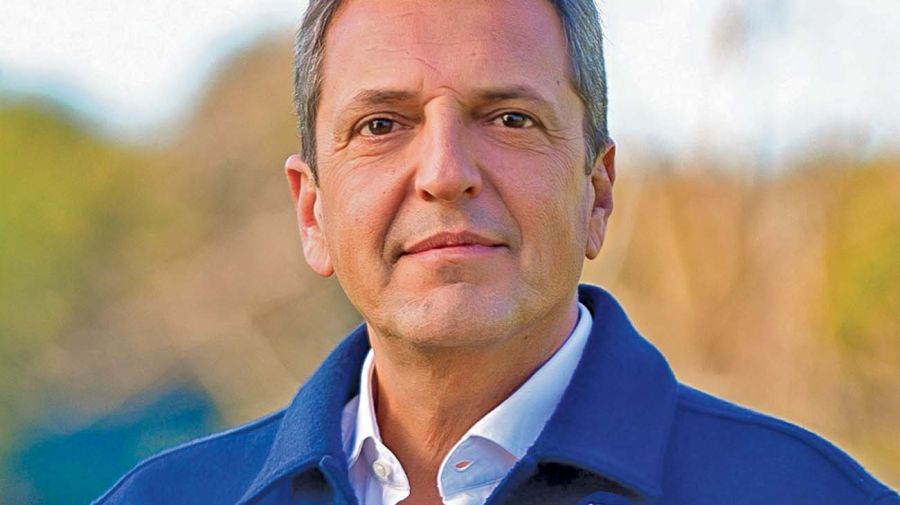
JULY
W27. The second day of the month sees the first genuine opposition triumph of the year with Juntos por el Cambio grabbing San Juan from Peronism without the aid of any ruling party offshoot in gubernatorial voting delayed almost two months by the Supreme Court ban on Sergio Uñac’s re-election bid – although not a member of any of the opposition coalition’s three main parties, Marcelo Orrego paints the province yellow with almost half the vote while Uñac’s brother Rubén cannot even win within the Peronist 44.3 percent, finishing 10 points behind former three-term governor José Luis Gioja. A boost for Rodríguez Larreta as much as for the opposition since the three hopefuls backing Bullrich can only win 1.8 percent between them while again the libertarians fall below four percent. A Mercosur summit at the Iguazú waterfalls fails to resolve differences over a free trade agreement with Europe, protectionism and the re-admission of Venezuela. IMF-related trips to Washington with intense negotiations.
W28. Perhaps the most bullish economic week of the year for the government and for the Massa candidacy as the Independence Day inauguration of the Néstor Kirchner gas pipeline amid great fanfare (President and Vice-President together for once) spurs hopes of a Vaca Muerta shale boom while inflation drops for the second month running to six percent for June. But annual inflation is still triple-digit, hardly justifying the 29 percent interest rates on soft loans of up to 400,000 pesos offered the elderly. The Supreme Court gives a green light to Jorge Macri’s City mayoral candidacy despite the lack of recent local residence requirements. A minor scandal erupts around the alleged sale of political candidacies by the Milei camp although the libertarian might have problems seeing it as a scandal at all, regarding it as part of his call for self-financing campaigns with candidacies a market commodity like everything else (including human organs). But some opinion polls start showing Milei as dropping below 20 percent. Messi-mania mesmerises Miami.
W29. The Santa Fe provincial primary gives Juntos por el Cambio a massive win in a major province, more than doubling the Peronist vote at 63 to 28 percent, and within that victory further momentum for Rodríguez Larreta since his candidate Maximiliano Pullaro tops Bullrich-backed Senator Carolina Losada by 32 to 21 percent (most of the other Juntos votes go to former Rosario Socialist Mayor Mónica Fein within a “front of fronts” defying a trend to extremism). Losada had been widely expected to win as the more nationally known hopeful with Bullrich’s blessing and a more sophisticated urban image while her implied accusations against Pullaro as being in cahoots with Rosario’s murderous drug-traffickers as a former provincial security minister were expected to stick but her fellow-Radical rival has more solid backing in the rural hinterland. The surprise raises the question of whether silent majorities will trump intense minorities elsewhere. President Fernández takes leave of the Old World by attending the Madrid summit of the European Union and the Community of Latin American and Caribbean States (CELAC or ECLAC in its Spanish acronym) where he wins brownie points by persuading a post-Brexit EU to use the name “Malvinas.” The 29th anniversary of the 1994 terrorist car-bomb destruction of the AMIA Jewish community centre is marked. García Cuerva formally succeeds Poli as the 13th Archbishop of Buenos Aires. The 135th Rural Society farm show begins at the Palermo exhibition grounds in a drought year with the economic damage already estimated at US$20 billion.
W30. As the month draws to a close, Massa finally secures a preliminary agreement with the IMF on the back of boosting revenues by upping the PAIS tax (7.5 percent for goods and 25 percent for services) on all imports except basic foods and health and educational items, a move seen as a disguised devaluation, and boosting Central Bank reserves via offering regional economies a preferential exchange rate of 340 pesos in what might be called the fourth edition of the “dólar soja” (except that soy is almost the only item absent) – the latter emboldens the minister to visit the Rural Society farm show but his four main presidential rivals make far bolder pledges to scrap export duties and unify the exchange rate. But buying dollars dear to sell them cheap continues to dig a bigger hole for the Central Bank. The Peronists retain the city as well as the province of Córdoba when Daniel Passerini frustrates the optimistic challenge of Radical deputy Rodrigo de Laredo by over seven percent in a highly polarised race – Córdoba’s anti-K Peronists are immune from the nationwide swing against Kirchnerism. Pope Francis diagnoses Argentines as Argentina’s problem. In the penultimate day of the month the opposition gains fresh momentum for the upcoming PASO primary by adding Chubut to the recent wins in San Luis and San Juan – youthful PRO Senator Ignacio Torres, 35, ends two decades of Peronist rule by just 5,000 votes (or 1.6 percent) in an election possibly decided by weekend gales in the Peronist stronghold of Comodoro Rivadavia stunting the turnout there, even if the outgoing lame duck administration was a debt-ridden, strike-torn and poverty-stricken train wreck disowned by its own candidate. One of the few provinces where the libertarians reach double digits (as do blank or spoiled ballots). On the last day of the month Massa pays the IMF US$2.64 billion, again with yuans plus a last-minute loan from the CAF (Corporación Andino de Fomento) regional development bank, the Rural Society farm show in Palermo ends and the extradition of Jones Huala is ruled. The winter holidays are the best in six years with over 5.5 million tourists, including a record influx of over 600,000 from abroad.
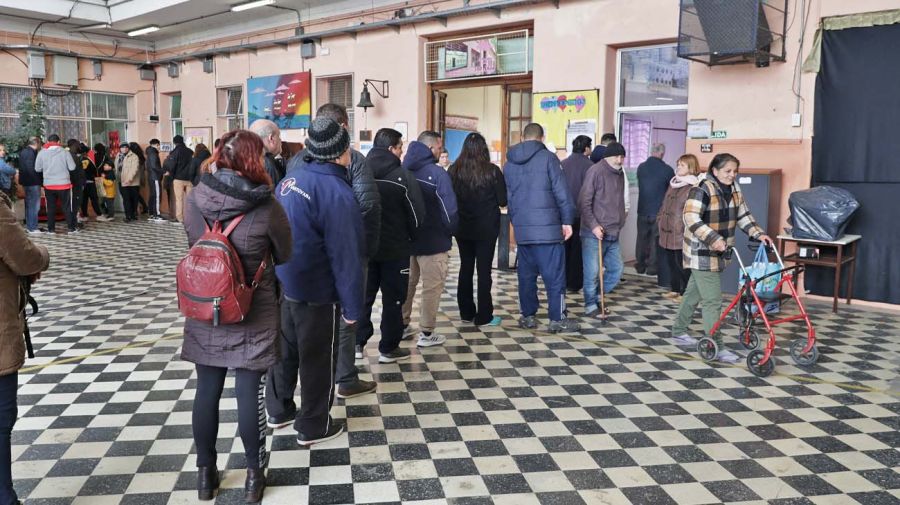
AUGUST
W31. The month begins with the usual raft of price increases as the news slows down with most things on hold for the PASO primary, for which government prospect look increasingly bleak with opinion polls placing their support closer to a quarter than a third of the vote – however, Massa pins his hopes on reaching the run-off against a divided opposition and then rallying the middle ground against an extreme austerity candidate (especially if Milei or Patricia Bullrich). Grabois dresses down US Ambassador Marc Stanley in his campaign offices after rejecting an invitation to the Embassy. A hot start to this winter month with temperatures of 30 degrees Centigrade on its first day.
W32. “Of primary importance” and “Public Apathy Stunts Outcome” (for this journalist’s Campaign Comments) are among this newspaper’s headlines on the eve of the PASO primary. Much uncertainty about a beauty contest which does not actually elect anybody (although filtering out all hopefuls below the 1.5 percent threshold), the ultimate opinion poll to correct the multitude of surveys with results for virtually every candidate (and undermined by input from as few as a quarter of respondents in some cases). Nor do memories of the last presidential PASO in 2019 (with Macri finishing 16 points behind after some opinion polls placed him a couple of vote ahead, “game over” ahead of the general elections) rule out the potential for surprise results. Meanwhile mass echoing of the simplistic opinion that all politicians are the same arouses fears as to the turnout. The brutal slaying of Lanús schoolgirl Morena Domínguez by motorcycle thieves (one of the two-thirds of children below the poverty line in Greater Buenos Aires) just four days before the vote, causing almost all closing campaign rallies to be suspended, is widely billed as a black swan game-changer but seems to have had as little effect on the outcome as the slaying of a La Matanza news vendor on the eve of the 2021 midterms. Saint Cajetan’s Day in the last weekend before the primary and just a couple of days after INDEC reports those below the poverty line up from 34.2 to 38.7 percent (8.9 percent destitute) only serves to underline mass impoverishment accelerated by inflation as an electoral issue.
W33. “Caste asunder,” “Milei has already won,” “Two’s grieta, three’s a crowd” and “The serpent’s egg” are some of this newspaper’s headlines following Milei’s stunning victory winning everything and nothing in what nevertheless remains a three-way split. Only 2.77 percent separate La Libertad Avanza (30.04 percent), Juntos por el Cambio (28.27 percent) and Unión por la Patria (27.27 percent) on election night in a 69 percent turnout. Many pundits still believe that Bullrich trouncing Rodríguez Larreta (only ahead in three provinces) with just under 17 of that 28.27 percent is more decisive for the presidency. But Milei’s victory is geographically more impressive than the percentage – below the 10 northern provinces (four for Massa and Corrientes for Juntos por el Cambio), the entire map is coloured purple except for a blue Buenos Aires Province and a yellow Entre Ríos, even down in Tierra del Fuego so dependent on the artificial industrial promotion regime the libertarian has vowed to scrap. While all Milei’s 16 wins are inland provinces, he trails third well below his average in both Buenos Aires City and Province – hinterland payback with Greater Buenos Aires the “mother of battles” no longer? Or the revolt of a middle class whose household incomes are increasingly flirting with the poverty line? While the Milei triumph is widely seen as a global trend of outsider populism arriving in Argentina with everybody loving a winner, doubts remain – his support could be a cathartic protest vote as much as reflect an appetite for real change with 30 percent a ceiling as much as a floor while his strong inland vote could have been protected by provincial machines to split the opposition without this strategy being repeated in October. But even so Milei still stands as the black swan with over seven million votes while Bullrich faces the most uphill task of the trio – how does she win the over three million votes needed to catch up with Milei when not even the tricky retention of Rodríguez Larreta’s 2.7 million rival votes suffices, by outbidding the drastic libertarian proposals of dollarization and shuttering the Central Bank (and CONICET research council) or gunning for the middle ground? The ruling parties win in both BA City and Province but look vulnerable in both cases with Kicillof just three points ahead of the combined opposition while PRO’s Jorge Macri edges Radical Senator Martín Lousteau by just 1.5 percent for the Juntos por el Cambio mayoral nomination (the letter “K” and the Macri surname are thus repeated). The PASO results preliminary for most are final in Santa Cruz due to the lemas system of simultaneous primaries and elections – there four decades of Peronism is ended, even if only by 4,300 votes and even if governor-elect Claudio Vidal is a repentant oil worker trade unionist from the old regime rather than a complete change. Massa’s panic reaction is a mindless 22 percent maxi-devaluation from 270 to 350 pesos per dollar (making nonsense of the supposedly preferential 340 offered farmers just a fortnight previously) with no accompanying measures to prevent it feeding straight into prices (beef rising some 30 percent almost overnight) – its only aim is to keep the IMF happy with Massa flying out to Washington two days later fishing for US$8 billion after briefly threatening to resign as minister. July inflation is posted at a moderate 6.3 percent (below City Hall’s 7.3 percent) but the maxi-devaluation leaves no chance of escaping double-digit inflation in August. The inauguration of his Paraguayan colleague Santiago Peña gives President Fernández a welcome excuse to escape the messy primary aftermath.
W34. Just four days after the lame-duck status of the Frente de Todos administration seems confirmed, the Johannesburg summit of BRICS unanimously approves its application (the day after the air crash killing Yevgeny Prigozhin, the leader of the Wagner Group mercenaries with Vladimir Putin widely suspected) – played up as a triumph and “a huge opportunity which must not be wasted” by President Fernández but rejected by both of Massa’s main rivals at the Council of the Americas. The minister stages a more effective rebound for a rejected government by returning from Washington with a disbursement of US$7.5 billion – Argentina continues to be “too big to fail.” Looting in many places which never reaches the dimensions of 2001 (more often than not a new form of robbery for criminals or opposition alarmism) even if “begone with them all” rage against politicians fully reflects that era. Congress approves rental law amendments reducing the contractual period from three to two years with updating every four months instead of 12 by a 125-112 vote (where the two libertarian deputies joining the Peronists in rejection prompts suspicions of a broader agreement). One pet topic of political speculation is the degree to which ex-president Macri might be the power behind Milei’s new throne. Opinions also remain divided as to whether Milei represents a melee collision course between drastic reform and vested interests or a road into this millennium offering self-employed youth a future.
W35. The last day of the month sees the final PASO primary figures released by the electoral authorities – these give La Libertad Avanza 29.86 percent, Juntos por el Cambio 28 percent and Unión por la Patria 27.28 percent with the difference between the trio reduced from 2.77 to 2.58 percent so it will not take much swing in October to alter the ranking, crucial for the run-off. Only two other presidential candidates are cleared to contest the general elections in October – Schiaretti of Hacemos por Nuestro País (3.71 percent) and Myriam Bregman for the Frente de Izquierda y de Trabajadores-Unidad (2.61 percent, of which her list received 1.86 percent). Milei continues to ride high with both the other sides (at least in the persons of Cristina Fernández de Kirchner and Mauricio Macri) seeming to crave his triumph – the latter seeing him as a door to permanent structural reforms and the former sensing that his one-man show would collapse much faster – while Bullrich and Massa with far more of a political machine continue to suffer an acute crisis of representation. In the Río Tercero mayoral elections in Córdoba the libertarians poll a mere 4.7 percent in the same place where Milei had won with 34.6 percent a fortnight previously – is there any structure below the foam? Hit hard by his humiliating PASO third place diminishing his authority, Massa throws money at his electoral problems with something for almost every sector, usually at somebody else’s expense – a 60,000-peso bonus over two months to all employees in the private and public sectors earning under 400,000 pesos (causing both provincial governors and private-sector employees to grumble), a 37,000-peso booster for all minimum pensions over the next three months, a six-month tax exemption for the self-employed, five tons of free fertiliser for farmers in drought areas and various price restraint agreements among other moves, while adding 7.65 million pesos to the budget. All far more the candidate than the minister with a blatantly electioneering plan doing more to pick than fill pockets. Bullrich presents Carlos Melconian as her pick for the Economy Ministry as the most pugnaciously feisty among orthodox economists with a rock star image to compete with Milei and avoid sharing the fate of the uncharismatic Rodríguez Larreta – Melconian in turn presents “a disruptive (plan) but in the system.” Milei’s romance with actress and imitator Fátima Florez begins to come to light. Berni accuses Greater Buenos Aires Peronist mayors of collusion with Milei. Two deaths at a similar age – engineer and libertarian scrutineer Mariano Barbieri (42) and starlet Silvina Luna (43) – are given prominent news coverage as signs of the times, the former stabbed to death for his mobile telephone in Palermo and the latter the victim of cosmetic surgery malpractice. Ex-minister and ex-senator Esteban Bullrich, stricken with amyotrophic lateral scelerois (ELA in its Spanish acronym), joins the Buenos Aires Marathon.
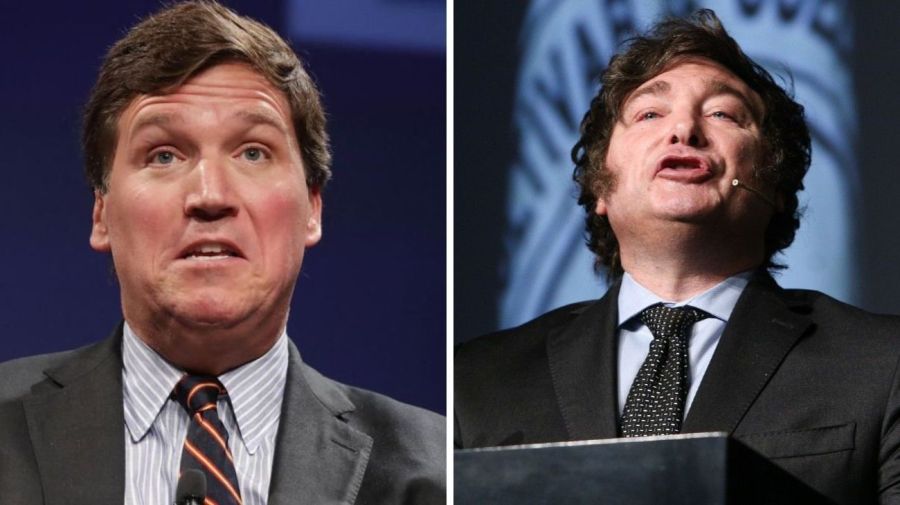
SEPTEMBER
W36. Controversial US alt-right journalist Tucker Carlson flies down here to interview Milei, making rather more of a splash than the largely meaningless appearance of President Fernández at the G20 summit in New Delhi as the ultimate lame duck. The previous day slum priests hold a community mass in Barracas to “exorcise” Milei’s criticisms of Pope Francis as a “sinister imbecile” and worse (insults only magnified in converse with Carlson) – Milei might note that social justice doctrines predate Peronism by almost two millennia. The Carlson interview neither adds to nor subtracts from support for the libertarian candidate where everybody seems to have their own Milei. Patricia Bullrich launches her platform featuring a bi-monetary system, tax cuts and state reform (including halving the Cabinet) while up in Washington IMF officials question Milei’s dollarisation proposals. Despite the platform, Macri remains a complication for the Bullrich campaign – when present, he makes her seem a puppet while his absence feeds speculation that he prefers Milei. Take five of the “soy dollar” is launched, permitting farmers to cash a quarter of their export dollars at any exchange rate. Monthly inflation stays in double digits at 10.8 percent, according to City Hall. Right at the end of the week a gigantic headache for Argentina when Manhattan judge Loretta Preska awards damages of US$16 billion for ignoring the other shareholders when expropriating 51 percent of YPF oil from Spain’s Repsol in 2012 – YPF’s market value is US$5 billion.
W37. An increasingly desperate Massa increasingly abuses his post as Economy minister to jack up the income tax floor a full million pesos to 1.77 million at an estimated fiscal cost of a trillion pesos, slashing that category of tax-payers to a mere 90,000, but inflation (which INDEC measures in midweek at 12.4 percent for August, the inevitable consequence of the post-PASO devaluation, with core inflation even higher at 13.8 percent) continues to devalue all his electoral goodies. While Massa’s cuts in state revenues (also at provincial expense) stoke inflation at one end, the earlier compensatory PAIS tax import surcharges push up prices at the other. Meanwhile the private sector is assured that whatever prices they may charge, the money will somehow be printed. Libertarian support for the tax cuts intensifies speculation of a Massa-Milei pact at Bullrich’s expense but it is entirely consistent with their principles – names linked to Massa appearing on La Libertad Avanza lists could easily be opportunists correctly identifying Milei as the future winner. A boost for Bullrich as Juntos por el Cambio conquers a major province from Peronism (even if a 15-party “front of fronts” does more to vindicate the methodology of her former rival, Rodríguez Larreta) – the Radical Pullaro’s 58.4 percent in Santa Fe almost doubles the Peronist vote with a seven-digit total of votes while Rosario Mayor Pablo Javkin narrowly wins re-election against a pro-Grabois rival. The government accedes to Milei’s request to postpone submission of the 2024 Budget beyond its statutory date of mid-September (S15) until after the elections. Milei’s prospective foreign minister Diana Mondino triggers a minor controversy by floating a “Hong Kong style” solution to the Malvinas sovereignty dispute.
W38. A new boost for Juntos por el Cambio in general and the Radicals in particular when Chaco goes the way of Santa Fe, even if in a tighter race – 46.1 percent for governor-elect Leandro Zdero as against 41.7 percent for three-term governor Capitanich (even if a Peronist total of 48.9 percent with two splinter candidates clearing the PASO primary threshold) while two libertarian candidates have barely four percent between them. The vice-presidential debate is held in midweek with the only female in the quintet, libertarian Victoria Villarruel, by far the feistiest. Massa doubles down on his “plan platita” by extending major tax relief to the self-employed, also suspending export duties for the struggling dairy industry for the rest of the year. Supreme Court Chief Justice Horacio Rosatti speaks out against the “fantasy” of dollarisation. President Fernández addresses the United Nations General Assembly with the “blockades” of Cuba and Venezuela and IMF interest surcharges the main targets of his criticism. Milei snuggles up to the supremely “caste” veteran trade unionist Luis Barrionuevo.
W39. A hat-trick for Juntos por el Cambio and its Radical wing (including two major provinces) is completed when Senator Alfredo Cornejo emerges from Mendoza’s elections as the province’s once and future governor – netting just under 40 percent, Cornejo’s main challenge is the friendly fire of ex-PRO Omar De Marchi (just under 30 percent) while the Peronists cannot even reach 15 percent, barely ahead of the Greens with almost 12 percent. Neither Mendoza nor Chaco thus end up provincially with the local winner of nationwide PASO primary voting (Milei and Massa respectively). But still uphill for Bullrich with opinion polls showing incomplete retention of the more moderate Rodríguez Larreta vote. The IMF rebukes Massa for his wild electioneering. INDEC reports two out of every five Argentines (40.1 percent, including 9.3 percent destitute) as being below the poverty line in the first half of 2023 with more to come expected in the second half, given runaway inflation – so many people outside the system seems better pickings for the anti-system Milei or Massa with his deep pockets than for Bullrich although the margins are so slender when the three leading candidates total less than half the electorate. The Buenos Aires provincial legislature scandal over Peronist middleman Jorge ‘Chocolate’ Rigau, caught cashing dozens of debit cards belonging to apparently bogus employees at an ATM much earlier in the month, begins to break – how big a chunk of the legislature’s 62-billion-peso budget is this the tip of the iceberg? Strangely enough, Milei, whose diatribes against a corrupt “caste” lie at the very heart of his campaign, has nothing to say here. Right at the end of the month an even bigger scandal breaks with the videos of Buenos Aires Province Cabinet Chief Martín Insaurralde (black?)swanning around with a skanky model in a yacht off Marbella, having no choice but to resign the same day the story breaks in order to limit the damage – surely the most technicolour obscenity of corruption since José López tossing dollar-laden bags over a convent wall in mid-216 and every indication of this proving an electoral game-changer although not to be against all logic. The City mayoral debate is held in midweek with a “safety first” Jorge Macri sitting on his advantage, Peronist Leandro Santoro chasing the middle ground and libertarian Ramiro Marra playing the abrasively simplistic showman. International Atomic Energy Agency (IAEA) director-general Rafael Grossi is re-elected for a further four years.
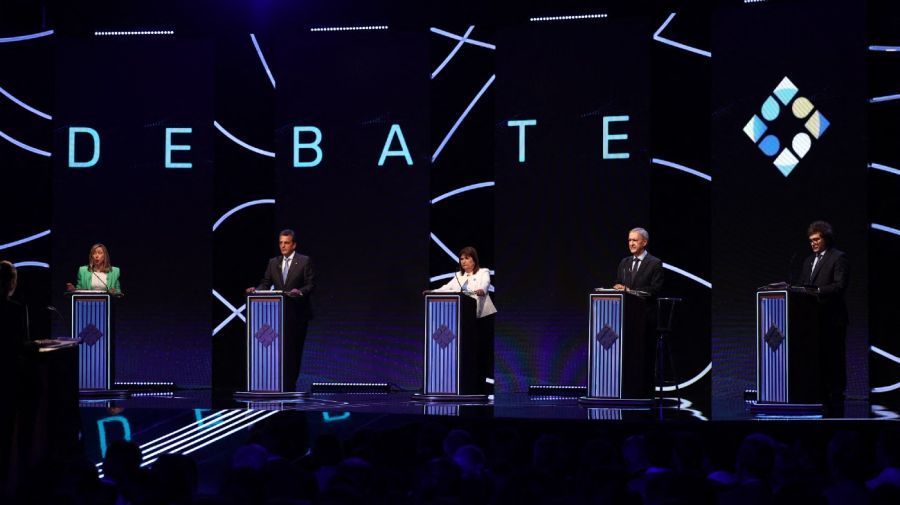
OCTOBER
W40. The month begins with the first presidential debate in Santiago del Estero against the backdrop of the Insaurralde scandal which strangely fails to feature much in the rigid format of this heavily scripted encounter, helping a Massa appealing for national unity to be seen as the winner by most – largely by default with Bullrich shaky in the economic segment, Schiaretti overly self-referential with Córdoba if also the most specific and Bregman too dogmatic in defending pickets and slamming the IMF while Milei is subdued during the debate but is sued by Bullrich later in the week for calling her a Montonero terrorists planting bombs in kindergartens five decades ago (even during the debate he crossed several lines in trying to equate guerrilla and state terrorism, perhaps encouraged by Villarruel’s success a fortnight previously). Invited to pick the debate’s third segment, the general public ignores corruption. President Fernández has no comment on the Insaurralde scandal, preferring to restrict his comments that week to congratulating warmly Argentina’s first female champion of the Youth Chess World Cup. The reticence of Kicillof’s Juntos por el Cambio gubernatorial rival Néstor Grindetti, insisting on “never meddling in private lives,” is especially strange, suggesting a cross-party conspiracy of silence. The government asks the IMF to roll over all the payments due that month to Halloween. The World Bank joins the sceptics about dollarisation while Massa floats a post-modern digital currency during the debate.
W41. The week is overshadowed by the sanguinary Hamas terrorist foray into Israel out of the Gaza Strip in the preceding weekend (O7) – Argentine lives are also at stake. September inflation is no better than August at 12.7 percent with annual inflation rising to 138.7 percent while the “blue” dollar is on either side of four digits during the week, prompting Milei to dismiss the national peso currency as “excrement” and advising against the renewal of fixed-term deposits, which leads the government into calling him an “economic terrorist” (worse than Hamas, apparently). Both the key item of food and beverages (14.3 percent) and core inflation (13.4 percent) are above the September average. The second and final presidential debate in this city (held on the birthday of Juan Domingo Perón) has more voltage than the first with Patricia Bullrich the main protagonist making an almost monothematic attack on Kirchnerite corruption (even if dollar volatility is starting to become the main issue) since Massa is more on the defensive after the fallout from the Insaurralde scandal while Milei is uncomfortable without economics among the segments (no place for international relations either, despite the Hamas attack the previous day). Despite the tiny margins and the huge potential swings, the debate seems to have little impact on the course of the campaign, lacking even any clear polarisation. Argentina appeals the Preska YPF ruling in midweek. Forest fires in Córdoba amid relentless drought.
W42. The voters approach election day amid a prevailing gloom with “Things have never been worse” on many lips, especially among those too young to remember the 1976-1983 military dictatorship, the 1989 hyperinflation or even the 2001-2002 meltdown. The closing rallies before the general elections fail to add anything to the campaign or place any candidate clearly ahead of others. But one underhand government stunt may have been a factor – under the guise of inviting those against transport subsidies to waive them, posters plastered everywhere warn that an opposition victory would lead to train rides costing 1,100 pesos with bus fares of 700 pesos as against 53 and 73 pesos respectively under the current government. President Fernández flies to China for the 3rd Forum of the Belt and Road Initiative, where he gains permission to expand free use of the currency swap by 47 billion yuan or US$6.5 billion, further boosting government chances. There is a crackdown on currency transactions outside the official circuit. Senator Matías Rodríguez (Frente de Todos-Tierra del Fuego), 41, a La Cámpora militant, commits suicide five days before the election. Amendments to the rent law providing for contracts to be updated twice a year instead of annually are published in the Official Gazette and promulgated. The yacht Insaurralde used, Bandido 90, is placed on the auction block.
W43. Massa surprisingly wins the general elections, pushing himself into a November 19 run-off against Milei. The run-off pair share all 23 provinces with Massa winning in 13 and Milei in 10 (including Córdoba, Santa Fe and Mendoza) while Patricia Bullrich only triumphs in the Federal Capital with only three second places elsewhere. Their respective percentages are 36.68 percent for Massa, 29.99 percent for Milei and 23.84 percent for Bullrich while Schiaretti polls 6.92 percent, almost doubling his PASO primary tally (mostly at Bullrich’s expense) with Bregman in last place with 2.7 percent. In a turnout of 77.65 percent (over 27.1 million voters) Massa gains almost three million votes from his PASO total while Bullrich drops over a million. In this City Jorge Macri comes within inches of the absolute majority needed to clinch first-round mayoral election with 49.61 percent, prompting Santoro to back out of the run-off two days later (perhaps to give PRO activists less motive to be out in force for the national run-off). Peronists Kicillof (Buenos Aires) and Raúl Jalil (Catamarca) are both comfortably re-elected, the former with almost 45 percent of the vote, but the ruling coalition loses Entre Ríos to Frigerio – although only three of the 23 provinces are voting locally along with this city, they represent almost half the electorate (48.4 percent). Finally, the Congress results are given as 108 deputies (-10) and 34 senators for Unión por la Patria, 93 deputies (-25) and 24 senators for Juntos por el Cambio and La Libertad Avanza 37 deputies (+34) and eight senators with 19 deputies and six senators representing other forces although these figures change slightly before the new Congress swears in – Juntos por el Cambio can only retain two of the 11 Senate seats being defended. Perhaps the most shocking result is the Peronist vote in Insaurralde’s Lomas de Zamora surging more than 10 points from the PASO primary since the Marbella scandal – fear of the unknown clearly outweighs anger. Massa’s victory when presiding over three-digit inflation and 40 percent poverty together with some ill-timed corruption scandals defies belief and he is widely seen as the inevitable run-off winner but he may have already shot his bolt with scaremongering and multi-trillion outlay as the last of the big time spenders taking him about as far as he can go with a couple of million votes still needed – three voters out of every eight is almost his ceiling with his opposition finally no longer divided. Massa’s triumph, which perhaps reflects how growing dependence on the state has eroded Argentina’s traditional middle-class majority, is nevertheless the worst Peronist performance in the 40 years of democracy, worse even then the first in 1983. Meanwhile elimination, snatching defeat from the jaws of victory in an election which was theirs to lose not so many months ago, shatters the fragile Juntos por el Cambio unity with Bullrich and ex-president Macri urging overt support for Milei, a course rejected by all other opposition leaders, especially the Radicals, in favour of neutrality – this deal with Macri gives Barrionuevo the excuse to ditch Milei in favour of the victorious Massa. Cristina Feernández de Kirchner’s strategic absence from the campaign also deprives the opposition coalition of its main common denominator. Milei, who had been fancying his chances of an outright win, is bitterly disappointed but still in the running against a vulnerable rival. Petrol shortages in the last days of the month, a result of capped retail prices being overtaken by the wholesale, while the US$2.6 billion owed the IMF for the month is paid off on its last day, as arranged at the start.
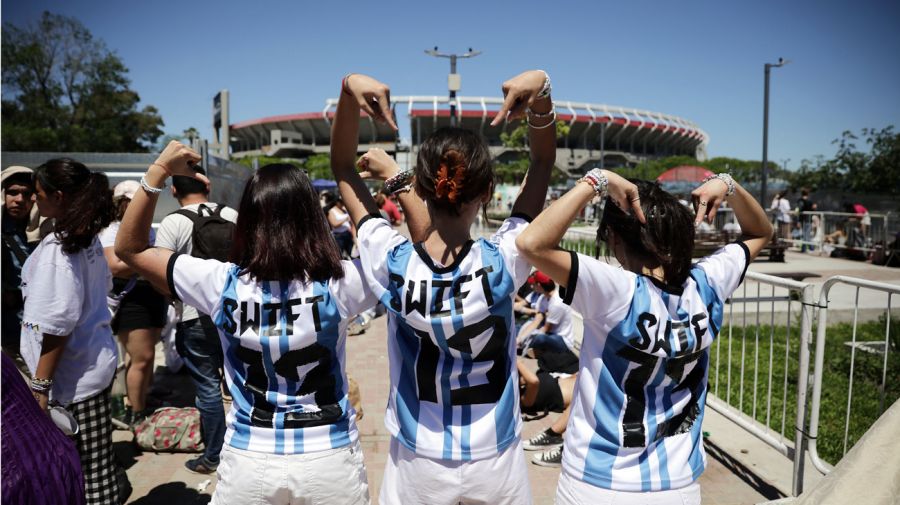
NOVEMBER
W44. The run-off race formally opens on the second day of the month at the Legislative Assembly where the final results of the presidential elections are read out: 9,853,492 (35.98 percent) for Massa and 8,034,990 (29.34 percent) for Milei confirmed for the run-off with percentages of 23.29, 6.58 and 2.64 for the eliminated Bullrich, Schiaretti and Bregman respectively in a turnout of 77.04 percent. Both run-off rivals also need to decide whether victory is desirable with rainfall finally arriving to promise a better harvest and an energy surplus gathering steam or whether this is a good election to lose with all the problems kicked down the road. Massa confirms that Cristina Fernández de Kirchner would have no place in his future Cabinet while not volunteering any other names. Milei seems to be positioning himself as an impossible choice by pledging to cut relations with Brazil, China and the Vatican. Juntos por el Cambio doves insist on accepting the opposition role assigned them by the electoral result, given the run-off choice between a corrupt populist and a far-right extremist, although many pundits would also insert the coalition founder as a third key player with three five-letter surnames beginning with “M” – Massa, Milei and Macri. Yet the PASO votes of the latter pair (if we read Bullrich for Macri) add up to only 47 percent, thus reinforcing the prevalent forecast that Massa’s October win would give him the momentum to prevail. The outgoing Frente de Todos government is obliged to spend a considerable amount of its time on the Middle East conflict with the Argentine hostages in the Gaza Strip.
W45. Taylor Swift is all that matters to many people in this week. The IMF toughens its stance on Massa’s electioneering. The vice-presidential candidates debate in midweek with Cabinet Chief Agustín Rossi, Massa’s running-mate who takes pride in the minister/candidate’s inflationary tax cuts, accusing Villarruel of violating Argentina’s human rights consensus while she retorts that mass poverty and corruption are far more current issues. Mostly a slanging-match with no real policy proposals. Massa’s momentum from his October win starts giving way to some opinion polls favouring Milei (one of them run by Massa’s brother-in-law) with the opposition finally reduced to a single candidate – the election becomes his to lose, depending on how the libertarian lion roars in the upcoming debate. If the electorate was originally divided into three thirds with two each for populism and the opposition, Milei is the only option combining both while Juntos por el Cambio voters are far less divided than the leadership. This does not prevent Milei from crying fraud in advance with surveys pointing both ways. The latest scandal is aimed far more specifically at Kirchnerism, centred around the illegal espionage of ex-policeman Ariel Zanchetta at the behest of ultra-Kirchnerite deputy Rodolfo Tailhade and La Cámpora militants. The venal Mendoza federal judge Walter Bento, prone to extorting bribes in exchange for acquittals, is kicked off the bench by the impeachment jury of the Council of Magistrates. The successful transport fare scare campaign is renewed with Transport Minister Diego Giuliano revealing that just 1,500 people have accepted his subsidy waiver proposal.
W46. The final week before the run-off begins with a presidential debate which is little more than a ruthless ambush of an unexpectedly tame lion – the immediate verdict is a walkover for Massa but in hindsight he may have sealed his fate in overdoing the worst stereotype of professional politicians with his heavily scripted bullying. Two men who were the first pick of little over a third of the electorate in the PASO primary now compete to be the lesser evil. Beyond the claims to be defending democracy against fascism and ending decades of frustration, it is not only a question of the people behind the two candidates but which is their true face? Will Massa bring national unity or remain in hock to the Kirchnerism dominating Congress or if his own man, would he follow his pro-market instincts or carry short-term populism to extravagant extremes beyond ultra-Kirchnerism, as he has been doing as minister? Despite his straight talk, Milei is a walking contradiction as a libertarian with an authoritarian discourse and running-mate – for all his scary ideas and downplaying state terrorism, should he be feared more for weakness than as a strongman, losing control and self-control with not only the sincerity and merit of his proposals at stake but also the means of implementing them? But no choice at all would be worse. Massa spends most of his last campaign days in Greater Buenos Aires while Milei goes inland with his main closing rallies in Rosario and Córdoba. Even with monthly inflation returning to single digits at 8.3 percent for October, an annual rate of 142.7 percent still weighs on the minds of voters with a pension hike of 20.87 percent looking very inadequate for the last quarter of the year, even with bonuses for the minimum benefits. Villarruel proposes using the former ESMA Navy Mechanics School concentration camp for purposes other than a memory site. President Fernández breaks his campaign silence to mark the sixth anniversary of the sinking of the submarine ARA San Juan.
W47. An election year spanning 41 weeks is over in the two hours it takes Massa to recognise defeat after the polls close (a merciful reprieve from a disputed cliff-hanger with fraud charges flying thick and fast) – five voters out of every nine opt for Milei (55.69 to 44.31 percent) in a turnout of 76.3 percent with Massa only winning in Buenos Aires Province, Formosa and Santiago del Estero (the former only just) while Milei topped 60 percent in no less than seven of his 20 provinces. Although voting shifts are more complex, 90 percent of Juntos por el Cambio and half of the Schiaretti voters switching to Milei would more or less explain his numbers. The reverse result would have been the bigger surprise in the current dire economic context with Massa a latter-day Victor Frankenstein destroyed by his own creation of a chainsaw to spilt the opposition and now about to turn on the country at large. This newspaper’s headlines include “Brace yourself,” “Destination unknown,” “Method in his madness?” and “The Lion King” – the outsider has a mere three weeks to prepare himself for going inside. An impressive but in some ways an artificial majority with a hefty component of borrowed and protest votes – the French inventors of ballotage apply it to both presidential and parliamentary elections to ensure some symmetry but in this case the highest percentage in 40 years of democracy is accompanied by a gridlocked Congress where the libertarians are very much a junior partner. Many even vote for Milei on the understanding that they preferred a candidate saying horrible things he could not possibly implement to a Massa doing horrible things in real life – i.e. their vote is conditioned on not being a mandate. Milei’s conversion to pragmatism begins just two days after his victory with a friendly chat with “Communist” Pope Francis – in his transition encounter with the outgoing President the same day, Fernández also warns him against a simplistic rejection of such complex giants as Brazil and China. Half the future Cabinet is in place by the end of the week but Villarruel is already being steered away from her previous domain of the Security and Defence portfolios. Converting campaign rhetoric into reality is a far stiffer challenge – far from having a caste with whom he has to negotiate foot the bill, even leaving state companies adrift and suspending all public works on top of the elimination of political spending would only cut about a quarter of the fiscal deficit. Manhattan judge Preska rules that YPF shares may be used in lieu of cash to pay the US$16 billion stemming from her September ruling – creditors might very well end up preferring the shares of a lucrative oil company to government bonds. INDEC gives its third and final estimate of Argentina’s population as 45,892,285 inhabitants, sharply down from the initial figure of 47,327,407 in May, 2022.
W48. President-elect Milei finally confirms Luis Caputo (a Finance minister in the 2015-19 Mauricio Macri administration, which makes the move look more like a Macri foot in the door than it is) as his future Economy minister amid speculation that this “Messi of finances” might be a stopgap for the dirty work. They spend the first half of the week in the United States meeting up with senior US government and IMF officials while in midweek Milei is formally proclaimed Argentina’s next president by a brief Legislative Assembly session with a final official result of 14,554,560 votes (55.65 percent) as against 11,598,720 (44.35 percent) for Massa, who on the same day somehow finds the cash for provincial governors to pay the Christmas bonuses placed in doubt by the Economy minister’s tax cuts. The Congress Impeachment Committee winds up 11 months of proceedings and approves the impeachment of all four Supreme Court justices on several counts of malfeasance – Milei has the option of aborting this ultra-Kirchnerite initiative early next year via submission to a Congress vote or holding the tribunal hostage for approving his drastic decisions. The jury remains out on how the campaign firebrand and transitional pragmatist will function in office. There is a clear mandate for change in a changing society in a changing world but is it changing fast enough for the transformation envisaged by Milei? If Massa failed to rally a majority to defend acquired rights against Milei’s chainsaw, that is because those rights have been emptied for too many people falling outside the system and an impoverished middle class, especially youth but is that fatigued society ready for the “blood, sweat and tears” (which is pep talk and not a programme of government) and the year of stagflation explicitly promised by Milei as a result of the monetary overhang left by the outgoing government? On the international front, Gerardo Werthein is named Ambassador to Washington while Daniel Scioli is kept on in Brasilia and prospective foreign minister Mondino confirms that Argentina will not be joining BRICS. Also abroad Henry Kissinger dies at the age of 100. Congress has yet to have a Speaker and the Senate a provisional president. One positive sign from the constant flux of Milei’s appointments is naming the highly professional Córdoba technocrat Osvaldo Giordano to head ANSES social security administration instead of his defeated Buenos Aires Province gubernatorial candidate Carolina Píparo (a hard luck story whose baby boy only lived a week when she was shot in a 2010 bank hold-up but lacking the qualifications for the post) as a political consolation prize.
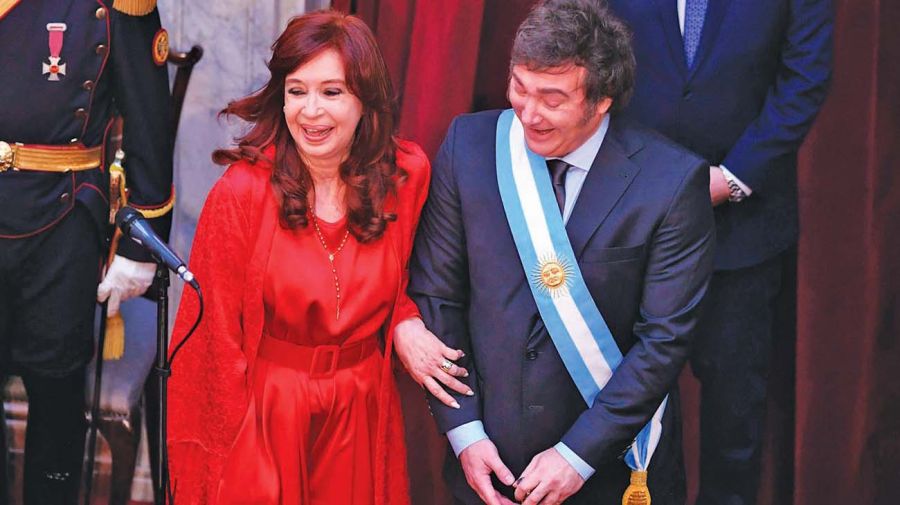
DECEMBER
W49. The final transitional week ends with Milei being inaugurated on the 40th anniversary of the return of democracy, symbolically turning his back on Congress to give his inaugural address to the crowd aside (while an “up yours” from Cristina Fernández de Kirchner perhaps draws the most attention) – Ukrainian President Volodymyr Zelenskyy is the star guest par excellence. Milei touches base at least virtually with Elon Musk. The president-elect completes his appointments with a PRO takeover of the Villarruel slice of government, handing over the Security and Defence Ministries respectively to the defeated presidential ticket of Patricia Bullrich and Petri while the Central Bank helm goes to Caputo’s business partner Santiago Bausili. In their penultimate day the departing Central Bank team devalue 10 percent to leave the dollar at 400 pesos. In keeping with Cristina Kirchner’s dictum that both houses of Congress should be headed by the presidential party, La Rioja deputy Martín Menem (nephew of the late ex-president) and Formosa Senator Francisco Paoltroni are named – the former evokes the parallels between the challenges facing Milei and Carlos Menem as presidents with transformational ambitions confronted with hyperinflation although Menem had a far more solid Peronist political base (Néstor Kirchner, elected with just 22 percent of the vote in 2003, would be more comparable here). Former Justice minister Rodolfo Barra is named Treasury prosecutor, ignoring both his youthful Nazi leanings and the fact that he exceeds the age limit.
W50. Two days after the inauguration Caputo doubles the inherited exchange rate of 400 pesos to 800 (overshooting the 600-650 pesos previously tipped by Interior Minister Guillermo Francos), thus sending prices which had already made anticipatory surges in previous weeks soaring yet further – INDEC gives the inherited annual inflation as 160.9 percent by posting 12.8 percent for November. The monthly crawling peg of two percent announced for the immediate future seems totally out of sync with these percentages. The devaluation is only one of a battery of shock measures under the mantra: “There is no money,” aimed at convincing people that this is a poor country needing to work its way up rather than redistribute an imaginary wealth. The two supremely Kirchnerite levies of export duties and the PAIS (Para una Argentina Inclusive y Solidaria) tax are mobilised to cut the fiscal deficit but also pursuing a trade surplus since raising PAIS from 7.5 to 17.5 percent for imports together with the reloaded maxi-devaluation favouring exports will tilt the balance in favour of the latter, even at the expense of industry. The SIRA import restrictions are abolished. The main public spending cuts take the form of halving the Cabinet to nine ministries with government departments reduced from 106 to 54, renewing the contracts of state employees hired in the past year, the suspension of both any new public works and state advertising and a reduction “to minimal levels” of transfers to the provinces. Readjusting the income tax floor downwards (even if Milei voted for its virtual elimination when a deputy), cuts in subsidies for transport fares and utility billing and a reversion to updating pensions via presidential decree are all announced for early next year. The only initiative not reflecting austerity is to double AUH child benefits and increase the Tarjeta Alimentar food stamps by 50 percent. There is not much sign of sacrifices falling on a “caste” holding the government hostage – instead Massa’s sporadic strategy of averting fiscal collapse by using inflation to erode pensions, welfare benefits and state pay in real terms is being carried to new extremes. The comprehensive sweep of this programme belies its sloppy presentation, along with blocking the press from asking the many questions requiring clarification. The reaction of the money markets is relatively subdued but supermarket prices move up in a wide range between 20 and 100 percent, fuel prices surge by up to 45 percent and Aerolíneas Argentinas double many air fares. Bullrich anticipates mass demonstrations already coming up in the following week with a new anti-picket protocol. Bartolomé Abdala of San Luis displaces Paoltroni as Senate head under Villarruel. Having said no to BRICS, Mondino says yes to joining the OECD (the Organisation for Economic Co-operation and Development), renewing Argentina’s application frozen by the previous government.
W51. The middle day of this week is very much its D-Day with the picket march to mark the D20 anniversary of the violent demonstrations toppling the Alliance government and leaving 39 dead during the daytime and Milei’s nationwide broadcast decreeing a reform blitz in the evening. The march is relatively uneventful, thus leading the government to fancy that it has cleared at least one of the four main potential barriers to drastic reforms (social protest, along with Congress, the courts and provincial governors) but Milei’s mega-decree places him on a collision course with the others. Listing over 300 reforms covering 83 pages would exceed the space of this annual summary and the deregulatory mega-decree may well be far more next year’s story than this so we will not even start here – the institutional and social backlash (with protests that same evening) is surely only just beginning. Even when declaring a two-year public emergency to justify an emergency decree, the package is flagrantly unconstitutional because it is axiomatic that the executive branch cannot usurp legislative powers and nor can decrees repeal laws – whither legal security if they could? Since no self-respecting Congress or judge can accept this, the Milei administration must surely be anticipating rejection with its likeliest Plan B a plebiscite – and hopefully not seeking the solution in the Zelenskyy-style military garb donned by Milei when going to Bahía Blanca, the city worst hit by the previous weekend’s monster storms and gales. Boca Juniors idol Juan Román Riquelme wins postponed club elections by two-thirds of the vote against a list of former club president Mauricio Macri running under ex-minister Andrés Ibarra.
W52. The government presents to Congress its omnibus bill repealing, amending or innovating some 664 items of legislation, as well as delegating legislative prerogatives to the Executive Branch on an extremely broad range of fronts (economic, financial, fiscal, social, pensions, law and order, defence, utility billing, energy, education and health, among others). Describing its aim as “to promote private enterprise … while ensuring the benefits of liberty for all inhabitants by limiting all unnecessary state intervention,” the bill opens the door to privatising 41 public companies (including YPF, Aerolíneas Argentinas, Banco Nación and state media). Capital up to a value of US$100,000 may be declared without paying taxes. The electoral system is to be reformed with single-member constituencies replacing party lists for the lower house of Congress while eliminating the PASO primaries. Pickets blocking streets may now face prison sentences. The current mechanism for updating pensions is to be replaced by establishing increases via executive decree. Export duties (for now 33 percent for soy and 15 percent for all other farm produce) are to be adjusted by decree while taxation is to be progressively reduced for personal assets and increased for cigarettes. Fuel prices will be defined by the market, not the state. Final examinations are to be obligatory in all secondary schools with more leeway for home schooling as from the fourth grade while foreign students will be liable to university fees. Incentives will be provided for the transformation of informal into formal employment. An express divorce system permitting matrimonial bonds to be dissolved without court intervention will be introduced. All national courtrooms operating in the Federal Capital will pass from national to City Hall jurisdiction. This sweeping omnibus bill is to be submitted for approval by extraordinary sessions of Congress, convoked by President Javier Milei as from Boxing Day. The mega-decree issued on December 20 and covering multiple areas of national life has correspondingly run into resistance at several levels. On the same Wednesday the follow-up omnibus bill was launched, the CGT trade union confederation (which called a February 24 general strike the next day), both wings of the CTA labour umbrella and picket and leftist groupings demonstrated outside the central courthouse to protest the emergency decree with seven arrests made by a heavy police presence. There were also protests elsewhere in the country, especially numerous in Rosario, Santa Fe, Corrientes and Córdoba. Some of the groupings in Wednesday’s demonstration are also protesting at court level, contributing several of the 18 lawsuits challenging the decree as unconstitutional already lodged at the time of the midweek protest. At least one of these lawsuits was immediately knocked back on the grounds that the mega-decree was still awaiting confirmation. President Javier Milei showed scant patience with his critics, saying on Tuesday that he would put the mega-decree to a plebiscite if it ran into legislative or judicial rejection and accusing at least “some deputies of fishing for bribes.” Milei also continues to resist converting the mega-decree into parliamentary bills, the solution adopted by then-president Mauricio Macri in 2018 when his structural reform proposals ran into similar resistance. Decree 84/2023 published in the Official Gazette and signed by President Javier Milei confirmed the dismissal of some 7,000 public employees entering the civil service in the past year, as well as reviewing the contracts of all state workers dating from beforehand. Federal judge Marcelo Martínez de Giorgi on Tuesday acquitted various figures attached to the 2015-2019 María Eugenia Vidal Buenos Aires provincial government and former AFI intelligence agents on charges of conspiring in 2017 to frame trade unionists like Juan Pablo ‘El Pata’ Medina, who heads the La Plata construction workers. Four youths were convicted just before Christmas for the gang rape of a girl in Palermo on February 28, 2022, while two others were acquitted. Lautaro Pasotti (25) and Ángel Ramos (24) were sentenced to six years in prison while Thomas Domínguez (23) and Alexis Cuzzoni (21) received suspended one-year sentences in a trial lasting almost four months. One of the two youths acquitted, Franco Lykan (24), was nevertheless given a suspended six-month sentence for subsequently beating up a witness. Little over a week after Juan Román Riquelme’s landslide victory over the Andrés Ibarra/Mauricio Macri ticket in Boca Juniors club elections, Diego Martínez emerged as the team’s new trainer.
A Happy New Year to all readers!
















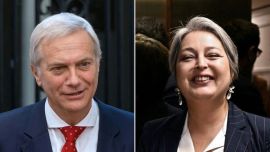
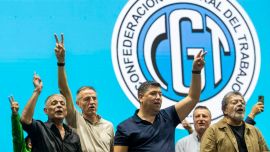

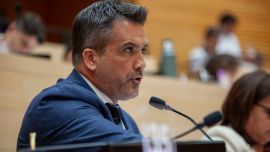

Comments